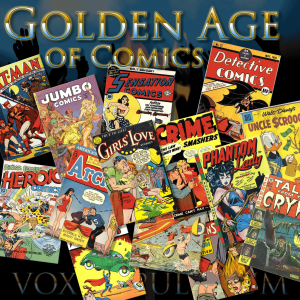If you’re at least a casual comic book fan you probably know the terms Golden Age, Silver Age, Bronze Age and Modern Age. If you’re a massive comic geek, you probably even know when those ages are. But why do they exist? What’s the relevance of splitting things up like that? What the cultural relevance of the specific ages as well? Somehow, studying comics is a full time job that you can actually get a phd in and teach in comics… but why? Why does anyone care about this nonsense? Mav and Wayne are joined by fellow comic scholars John Darowski and Anna Peppard to talk about the history of the Golden Age of Comics. What was it, and why was it important? And was it actually any good? Join us and let us know if you agree.
Citations and Links:
- This episode’s Call for Comments
- The Digital Comics Museum
- All in Color for a Dime by various authors
- Jump for Joy: Jazz, Basketball, and Black Culture in 1930s America by Gena Caponi-Tabery
- Super Boys: The Amazing Adventures of Jerry Siegel and Joe Shuster–the Creators of Superman by Brad Ricca
- Heritage Minutes: Superman
- EC Comics: Race, Shock, and Social Protest by Qiana Whitted
- The Americans: The National Experience by Daniel J. Boorstin
- The League of Regrettable Superheroes: Half-Baked Heroes from Comic Book History by Jon Morris
- Thank you to Maximilian’s thoughtForm Music for our theme
- John Darowski is a frequent guest on The Protagonist Podcast
- Anna Peppard is a co-host of Three Panel Contrast
- Follow Mav on Twitter: @chrismaverick
- Follow Wayne on Instagram: @tetroc2017
- Follow Mav’s Personal Blog: http://chrismaverick.com
- Follow Wayne’s Personal Blog: http://wayne-wise.com
- Follow us on Twitter: @voxpopcast
- Follow us on Instagram: @voxpopcast
- Follow us on Facebook: http://facebook.com/voxpopcast
- Make sure you subscribe on Apple Podcasts, Stitcher, Spotify or wherever podcasts are found and please leave us a review!
Podcast: Play in new window | Download





I think Wayne wins the podcast-verse this week for his subtle but not missed, at least by me, reference to The Ramones.
Thanks Steve! I was pretty sure no one noticed!
@chrismaverick @wayne_wise Nice! While superheroes tend to be the genre that’s looked back on the most,… https://t.co/ur7Zp14ywZ
Nice! While superheroes tend to be the genre that’s looked back on the most, I’ve found it’s the sci-fi genre that encouraged some of the most interesting material, at least for the time, having artists like F. Hanks, B. Wolverton,and Munson Paddock, who was especially expressive
More of Paddock’s Mars Mason work from Speed Comics (1940).
Yep. We definitely tried to address the other genres on the ep. But we could always do more.
You could probably do a podcast on the features and artists from Planet Comics alone. Really got the feeling the creators behind it wanted to do something special beyond simply doing work for a paycheck.
Definitely something to keep in mind. Sci-di comics aren’t my specialty. But sci-fi in general is sort of @JustThatNerdKid’s gig. So maybe we should do a show on the golden age of sci-fi comics and pulps together.